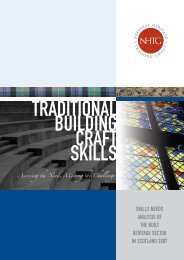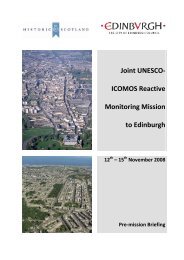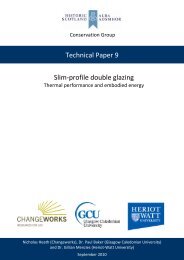NTS Report 4 Aug 2010 - National Trust for Scotland
NTS Report 4 Aug 2010 - National Trust for Scotland
NTS Report 4 Aug 2010 - National Trust for Scotland
Create successful ePaper yourself
Turn your PDF publications into a flip-book with our unique Google optimized e-Paper software.
28<br />
Going Local<br />
Community Partnerships<br />
So much time in <strong>NTS</strong> over the past few years has been devoted<br />
to problems that there is a danger of seeing a number of<br />
properties as liabilities, not opportunities.<br />
The proposed property portfolio review must look at alternative<br />
management models when it comes to identifying core<br />
properties which will be fully managed by the <strong>Trust</strong>.<br />
There is potential <strong>for</strong> more partnerships with communities, local<br />
authorities and businesses – the charity putting conservation<br />
safeguards in place and monitoring their implementation<br />
thereafter, but encouraging those to whom the property is<br />
entrusted to get on with it.<br />
There is also potential <strong>for</strong> developing a more entrepreneurial<br />
spirit among staff in their management and conservation of <strong>Trust</strong><br />
sites.<br />
This will take training, time and a change of culture. The centre<br />
and the periphery have to see each other as partners, not rivals.<br />
Going local means that central staff, subject to a range of<br />
safeguards, have to be willing to let go.<br />
Property staff have to understand that they will always work<br />
within a framework of mandatory <strong>NTS</strong> policies, and that training<br />
in conservation and financial management will be needed be<strong>for</strong>e<br />
there is a significant degree of devolution.<br />
Going Local, however, chimes with Government policy in the<br />
aftermath of the economic crisis. Ministers have expressed a<br />
readiness to empower third sector organisations. While there<br />
will be significant cuts in national spending, there will still be<br />
streams of funding <strong>for</strong> civic groups willing to put conservation at<br />
the heart of community regeneration.<br />
The <strong>National</strong> <strong>Trust</strong><br />
South of the Border, the <strong>National</strong> <strong>Trust</strong> is committed to giving<br />
local managers the freedom to be creative – to innovate and be<br />
distinctive so that “the spirit of their properties can shine<br />
through”. After a good deal of consultation, rules are in place to<br />
make clear who’s accountable <strong>for</strong> what, <strong>for</strong> what is mandatory<br />
and what is optional.<br />
Seaton Delavel Hall – loved by the local community<br />
One of the finest examples of the English Baroque is Seaton<br />
Delavel Hall, only a mile or so from central Newcastle. It is<br />
located in an area which has experienced considerable economic<br />
hardship.<br />
The Hall was acquired by the <strong>Trust</strong> after a consultation<br />
involving 100,000 local people – and a challenge to them to<br />
raise £1 million of the £3 million needed to purchase it. This<br />
they achieved in six months, primarily because they were<br />
encouraged to see the property as a community asset in which<br />
they were stakeholders.<br />
There are no genteel teas, though there are fish and chips from a<br />
local cafe. The local primary school uses the cellars and stables<br />
<strong>for</strong> acting, singing, dancing and storytelling. The grounds are<br />
available <strong>for</strong> camping, adventure activities and vegetable<br />
growing.<br />
Throughout England similar properties are hosting farmers’<br />
markets, obtaining rents by meeting a vast increase in the<br />
demand <strong>for</strong> allotments, hosting corporate conferences and<br />
weddings, turning stables into workshops <strong>for</strong> craftsmen, and<br />
securing partnership agreements with local companies.<br />
Farmers Markets — bringing in the community as well as rents<br />
<strong>NTS</strong> and Localism<br />
The <strong>National</strong> <strong>Trust</strong> <strong>for</strong> <strong>Scotland</strong> has been working with local<br />
communities <strong>for</strong> years through its Friends’ Groups and<br />
Members’ Centres – though not in a particularly systematic way.<br />
Board proposals to mothball properties in 2009 produced a raft<br />
of proposals from staff and community activists, many of them<br />
with real potential. Most had to be turned down because they<br />
required a cash injection. The <strong>Trust</strong> at that time could not make<br />
such investments unless there were good prospects of a quick<br />
return on its money.<br />
<strong>NTS</strong> should now consider proposals like Seaton Delavel Hall,<br />
promoting conservation as a driver of community regeneration –<br />
an area in which there are opportunities to draw down funding<br />
from health, third sector and job-training schemes.<br />
P16: The Review proposes that <strong>Trust</strong>ees should develop a<br />
strategy in which property managers and their local and regional<br />
advisers are given the training and authority to make most of the<br />
day-by-day decisions about their property, so long as these are in<br />
accordance with the charity’s Principles.<br />
Devolution of management in such cases should take place<br />
within a matrix of responsibilities agreed between central and<br />
local levels. This should ensure that conservation safeguards<br />
and a proper business plan are in place and that they should be<br />
subject to regular monitoring thereafter.


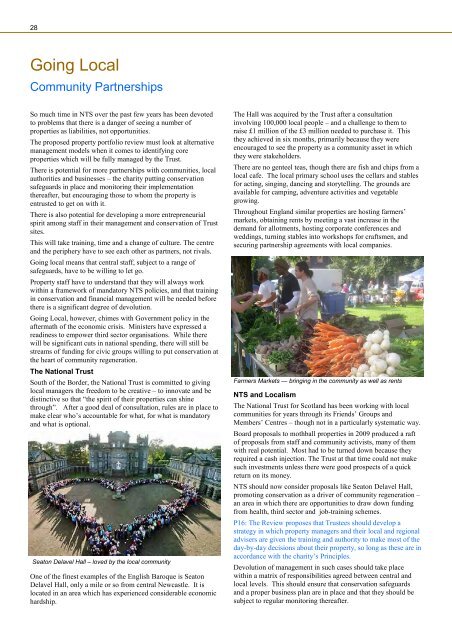
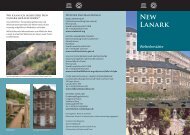
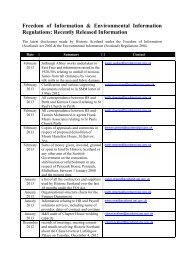
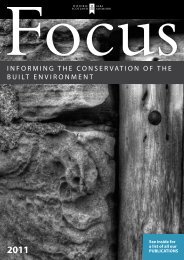
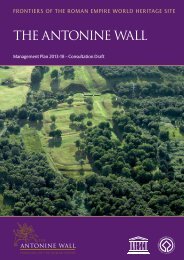
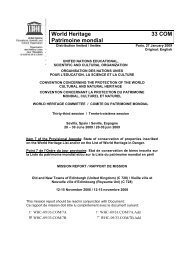
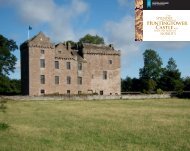
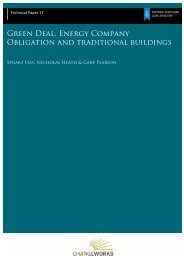
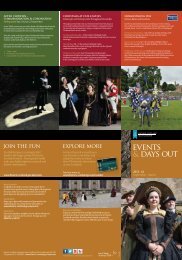
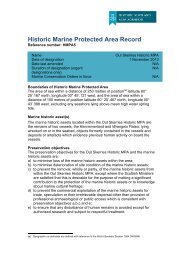
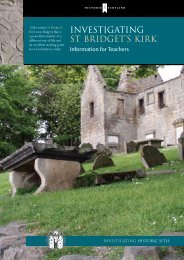
![Elgin Cathedral Wedding Brochure [pdf, 544kb] - Historic Scotland](https://img.yumpu.com/22301571/1/190x151/elgin-cathedral-wedding-brochure-pdf-544kb-historic-scotland.jpg?quality=85)

